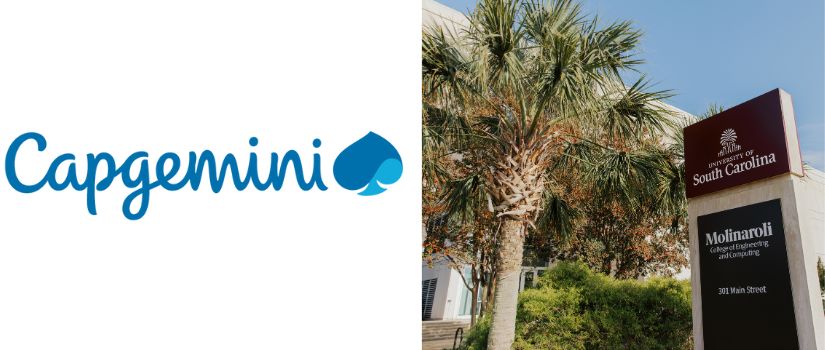Having qualified practitioners from industry in our classrooms is the perfect way to connect the foundational education of our students to real-world practice. - MCEC Dean Hossein Haj-Hariri
Capgemini, a global business and technology transformation company with several locations in the U.S., including an office in Columbia, is one of the top employers of Molinaroli College of Engineering and Computing graduates.
But with hiring recent graduates also comes the responsibility of training them.
Venkata Achanti, vice president, Microsoft Azure Practice Leader at Capgemini, has also helped in recruiting recent graduates to the company. He says that while time in the classroom is important, a graduate’s education is incomplete until they have work experience.
“What I realized is that for a computer science graduate to be able to function, it takes almost two years before they can stand on their own,” Achanti says. “My goal is to narrow that gap.”
To provide more real-world experience, Achanti, a member of both the Department of Computer Science and Engineering (CSE) and Department of Integrated Information Technology’s Industrial Advisory boards, collaborated with CSE Chair Homayoun Valafar to develop and teach a two-course certification track to familiarize students with key topics they will encounter in the work environment.
The course is designed to teach cloud computing through project management and group work, effectively simulating a workplace setting. At the end of the session, students will receive the Capgemini Cloud Native Development Certificate.
“We want to give students a solid foundational understanding of computer science as well as practical skill sets so that wherever they land, they are immediately functional,” Valafar says.
Computer science is a dynamic and ever-changing field, with new programming languages frequently released. Achanti and Valafar aim to not only teach their students the most current information but also give them a head start on keeping up with future changes.
“The field shifts every few years, so it needs to operate in a nimble way,” Valafar says. “One of the big tasks of our Industrial Advisory Board is to give us feedback as to where the industry is going so that we can shift the training as well.”
The program’s first course focuses on C# and .NET programming with a heavy emphasis on group work. The students completed a web application project and presented it to Capgemini. Senior computer information systems major Carolina Turner enrolled in the class, and worked with her group to create an e-commerce platform for users to buy movie tickets and write reviews.
“I learned a lot through the first course,” Turner says. “I did learn new skills, but I think I learned more about how having a good group can affect the outcome of a project.”
The second course focuses on Microsoft Azure Cloud Native Development, a more advanced platform for developing web applications. Turner decided to enroll in the program because this is the only cloud computing course offered at the college.
“Those experiences are going to make me more well-rounded for all kinds of different jobs,” Turner says. “Even if I don’t end up in a cloud computing position, the experience still gave me meaningful skills that will translate into the workforce.”
Hossein Haj-Hariri, dean of the Molinaroli College of Engineering and Computing, says the course is a valuable way for students to get ahead.
"Having qualified practitioners from industry in our classrooms is the perfect way to connect the foundational education of our students to real-world practice," Haj-Hariri says.
In addition to giving graduates a competitive edge in the workforce, the course is a powerful recruiting tool for Capgemini.
“They teach the students exactly what they need to learn,” Valafar says. “The courses are back-to-back in one year, so recruiters know the students and their work ethics and abilities. At that point they’re ready to make an offer.”
Since bachelor’s degrees account for 70% of all science and engineering degrees awarded, the college understands the importance of providing employment opportunities ahead of graduation. The partnership represents an important step in bringing practical education into the classroom, and Haj-Hariri hopes it is the beginning of a new trend for the college.
“Our students benefit immensely because it gives them a pathway to a job,” he says. “This is a shining example, and we’ll be trying to do more of this as we go forward.”
